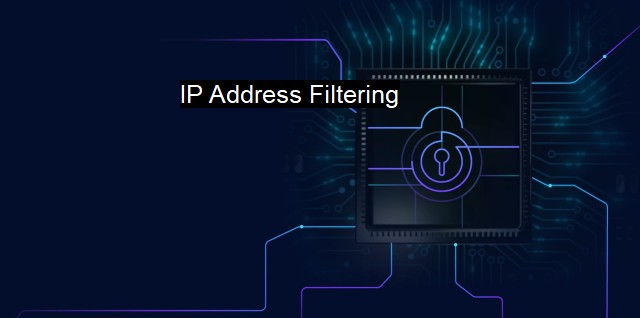
IP Address Filtering is a critical practice in the realm of cybersecurity and constitutes an enforcing strategy for antivirus software designed to prevent unauthorized access, guard valuable data, and protect infrastructure. It can be described as the technique systematically applied by networking software for controlling access to, or providing services over, a network based on an Internet Protocol (IP) address. This is comparable to the use of identity cards used for verification, where the IP addresses serve as the internet identity for machines with non-locational significance.
The fundamental principle behind IP Filtering rests during communications over a network where each data packet is attached with an IP address. The interacting devices recognize these addresses and decide either to allow communication (accept the packet), or refuse it (block the packet). This act of permitting or refusing data packets centered on their originating or destination IP addresses is IP Address Filtering.
Despite the variety of reasons to use IP address filtering, its manifest application is within cybersecurity to prohibit unauthorized access to networks or specific machines, implying it contributes to firewall configurations. Systems administrators set up rules in the firewall determining which IP addresses are authorized to interact with their network, where accepted addresses can have access while all others are blocked. For instance, organizations often configure their firewalls to block IP addresses generating substantial fake network traffic or those originating from locations likely to execute cyber threats.
Antiviral software also keenly utilizes IP Filtering. Viruses emerge in varied forms, and the prominent way that antiviral software responds to these is by tracing the unique pattern, or 'signature,' of each virus. This bestows the task of identifying the pattern onto antiviral software. IP address filtering takes preventative action by blocking suspicious IP addresses that tend to spread malware; thus, it mitigates the risks posed by any malicious entities on the Internet.
IP Filtering is particularly valuable when ideally co-integrated with other security measures - including antivirus packages. A pragmatic security strategy is a layered one where extreme reliance on a single technique is shunned. As a precautionary measure that incorrigibly obstructs all traffic from suspicious hosts, IP Filtering aligns with other security techniques, playing an active role in the overall defense strategy.
Additionally functioning as an inbound/outbound filter offers more versatility to IP Filtering. In the outbound context, it conserves bandwidth by prohibiting traffic to certain sites, forestalls access to potential threat vectors like known dynamic malware domains and mitigates outgoing connection risks. This is just as critical as inbound filtering, where it strengthens security measures by excluding communication with potentially harmful destinations.
IP Filtering has its limitations, the prominent one being its effectiveness relies greatly on the activities and inclination of the systems administrator in routinely updating and managing filter rules. savvy attackers can adopt IP spoofing–altering their IP address to guise as an authorized user to bypass filters. Like any cybersecurity measure, IP Filtering is not impermeable or invincible but is a powerful tool when optimally applied as part of a wide-ranging IT security strategy.
In a world where cyber threats increasingly pose significant risks and resources are consistently targeted, managing authorized network access remains a top priority for businesses, organizations, and individual users. Cybersecurity frameworks rely extensively on varied layers of protection, with IP Address Filtering held high as a notable component. Fundamentally applied with firewall configurations and antivirus utilities, it strains out surplus or potentially harmful internet traffic, meaningfully improving security resilience and incident response while fundamentally contributing to the defense strategy.
From saving bandwidth and reducing network congestion to threat deterrence, IP Filtering is a solution for defending computer systems from unsolicited interventions and harmful content. Thus, safeguarding not only the smooth and safe operations but also privacy, as an indispensable part of a holistic cybersecurity solution.

IP address filtering is a security measure used to block incoming network traffic from specific IP addresses. It is a technique used to prevent malicious attacks that often originate from known bad IP addresses.
IP address filtering is beneficial in that it helps to minimize network traffic, enhance network performance, and reduce the risk of cyber attacks by blocking known bad IP addresses. It's also used to restrict access to specific networks or resources for security and privacy purposes.
IP address filtering works by examining incoming network traffic and comparing it to a list of blocked IP addresses. If the source IP address matches any on the list, the network device will automatically block the incoming traffic from that IP address. This technique is often used in firewalls, routers, and other network security devices.
One of the limitations of IP address filtering is that it is not effective against attacks that use dynamic IP addresses. Attackers can easily change their IP addresses to evade detection and bypass IP filtering measures. Also, IP address filtering can sometimes block legitimate traffic if the source IP address is mistakenly added to the blocklist.